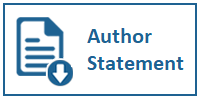Analisis Kinerja Algoritma Quick Double Merge Sort Paralel Menggunakan openMP
DOI:
https://doi.org/10.31937/sk.v11i2.1294Abstract
Processor technology currently tends to increase the number of cores more than increasing the clock speed. This development is very useful and becomes an opportunity to improve the performance of sequential algorithms that are only done by one core. This paper discusses the sorting algorithm that is executed in parallel by several logical CPUs or cores using the openMP library. This algorithm is named QDM Sort which is a combination of sequential quick sort algorithm and double merge algorithm. This study uses a data parallelism approach to design parallel algorithms from sequential algorithms. The data used in this study are the data that have not been sorted and also the data that has been sorted is integer type which is stored in advance in a file. The parameter measured to determine the performance of the QDM Sort algorithm is speedup. In a condition where a large amount of data is above 4096 and the number of threads in QDM Sort is the same as the number of logical CPUs, the QDM Sort algorithm has a better speedup compared to the other parallel sorting algorithms discussed in this study. For small amounts of data it is still better to use sequential sorting algorithm.
Downloads
Downloads
Published
How to Cite
Issue
Section
License
Authors retain copyright and grant the journal right of first publication with the work simultaneously licensed under a Creative Commons Attribution-ShareAlike International License (CC-BY-SA 4.0) that allows others to share the work with an acknowledgment of the work's authorship and initial publication in this journal.
Authors are able to enter into separate, additional contractual arrangements for the non-exclusive distribution of the journal's published version of the work (e.g., post it to an institutional repository or publish it in a book), with an acknowledgment of its initial publication in this journal.
Copyright without Restrictions
The journal allows the author(s) to hold the copyright without restrictions and will retain publishing rights without restrictions.
The submitted papers are assumed to contain no proprietary material unprotected by patent or patent application; responsibility for technical content and for protection of proprietary material rests solely with the author(s) and their organizations and is not the responsibility of the ULTIMA Computing or its Editorial Staff. The main (first/corresponding) author is responsible for ensuring that the article has been seen and approved by all the other authors. It is the responsibility of the author to obtain all necessary copyright release permissions for the use of any copyrighted materials in the manuscript prior to the submission.















